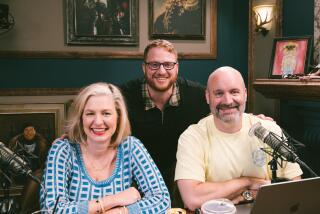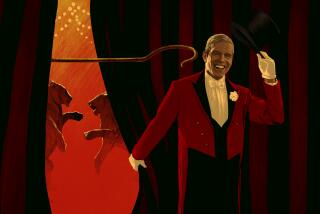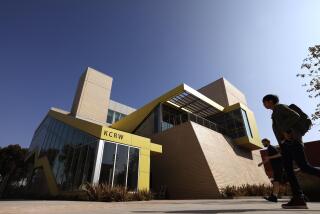‘Loveline’ Is a Radio Show and a Television Show
- Share via
“It’s a radio show, not a TV show.” That was the skeptical attitude that greeted Dr. Drew Pinsky and Adam Carolla when they met the press last fall to discuss the impending expansion of their popular “Loveline” talk radio show into television.
“When we did interviews, they were usually about, ‘How are you going to turn it into a TV show?’ ” recalls Pinsky as he and Carolla settle in for another encounter with a reporter on the Hollywood set of their new MTV program.
To the two hosts, “Loveline” is perfectly suited to the television medium. Carolla and Pinsky firmly believe that the teen- and young adult-oriented information and advice program is as telegenic and involving as any other talk show currently battling it out in the late-night TV wars. (The hour program airs weeknights at 11:30 p.m.)
“Think about what our competition is,” argues Carolla, 32. “It’s Letterman, Leno, Jerry Springer. . . . What is that? A host and a couple of celebrities sitting around. What is this? Two hosts, a celebrity, people phoning in, [a roving interviewer] out in the audience. . . .”
As a television entity, “Loveline” is unusual, however, in its emphasis on young callers and audience members who solicit advice about their various sex, relationship or substance abuse problems. The celebrity guests--who are usually Generation X-friendly actors or MTV-associated musicians--are there mainly to offer guidance and opinions rather than to talk about themselves and their careers.
The TV show is a streamlined and somewhat less graphic version of the “Loveline” radio program, which began airing on KROQ-FM (106.7) in 1983 and is also syndicated in 40 other U.S. markets. Pinsky and Carolla host both versions of the program.
Both the radio and TV programs mix irreverent humor with serious discussion. Carolla is a comedian who cut his teeth performing with Los Angeles’ Groundlings and Acme improvisational groups. Particularly on the TV show, his role is to toss out the quick quips and cutting comments.
Conversely, Pinsky, 37, known to the show’s followers as Dr. Drew, is the earnest dispenser of information and advice. A board-certified internist and addictionalogist, he joined “Loveline” about a year after it first kicked up its heels as a weekly program on KROQ.
“To me, TV is just another medium to try to communicate with people and to try to create an environment where people can change their behavior,” Pinsky comments.
“Drew understands that he needs Adam to be entertaining, crazy and funny in order to draw [young people],” says Scott Stone, who co-produces the TV show along with his Stone Stanley Productions partner, David Stanley. “But Drew is the license that allows us to do what we do. The response we usually get is, ‘Adam is really funny, but now I have a question for Dr. Drew.’ ”
*
The topics “Loveline” deals with--from a 24-year-old man’s compulsion to have sex in public to an 18-year-old woman’s complaint that her boyfriend views her too much as a sex object--are ripe for exploitation. Pinsky acknowledges that in the wrong hands, the TV program could have ended up like a “Jerry Springer”-type circus where the overwhelming intent is to titillate. He believes both versions of “Loveline” achieve a healthy balance between fun and responsibility.
The TV version isn’t as leisurely paced or as spontaneous as the free-flowing radio show. Partly to accommodate callers in different time zones, the TV show is taped rather than aired live. Stanley says the program receives about 800 calls and 1,000 e-mail messages each broadcast night. Selected respondents are then contacted and arrangements are made for them to be available over the phone at a time when the program is being taped.
Says Stanley: “Because it’s taped, if we hit on a question or response we have a problem with, we take it out. We tend to be a little tighter reined [than the radio show in terms of what’s acceptable]. And MTV does have their own broadcast standards.”
The TV project has suffered numerous setbacks since Stone Stanley Productions was hired by KROQ in 1995 to bring the radio program to the small screen. The TV version was originally slated to feature Pinsky and Riki Rachtman, who was then co-hosting the radio program. The project suffered a blow when Rachtman decided not to take part in it just eight days before the pilot was due to be filmed.
Pinsky recommended Carolla as a replacement. The part-time boxing instructor and former construction worker was known for his comedic portrayal of a character named Mr. Birchum on KROQ’s Kevin and Bean morning show. Carolla’s audition wowed Stone and Stanley as well as KROQ management, which immediately added him to the “Loveline” radio team.
Soon after, in January 1996, Rachtman left the radio show for his current gig as the host of his own program on KLSX-FM (97.1).
“Loveline” appeared set for national broadcast last September. New World Entertainment, which was then producing the project with Stone Stanley Productions, had an agreement to syndicate the show through Fox’s Twentieth Television. However, when Fox’s parent, News Corp., acquired New World, the deal fell through, and the show was dropped three weeks before its scheduled premiere.
It was Andy Schuon, executive vice president of programming at MTV, who was instrumental in bringing “Loveline” to the cable network just a few months later. Not coincidentally, Schuon is a former KROQ program director who was familiar with the program’s radio success.
“What attracted us to the show is it fits our demographic perfectly,” says John Miller, MTV’s vice president of original programming and series development. “It also offers information that’s difficult for [young people] to get. It’s difficult for them to talk to their parents, or even their peers, about these things.”
Yet even “Loveline’s” debut on MTV in November was postponed for two weeks after deejay Jim “the Poorman” Trenton threatened a lawsuit against the network, claiming ownership of the “Loveline” name and format. Trenton, who created and originally co-hosted the radio show at KROQ, has a lawsuit pending against Fox, the William Morris Agency (which KROQ hired to help get the TV project off the ground), Stone Stanley Productions and KROQ.
Trenton says he is still planning to file a similar suit against MTV.
“This is the worst thievery of an entertainment project that I’ve ever heard of. There’s no doubt that [“Loveline”] is my program,” complains Trenton, who is now hosting a 6-9 a.m. weekday show on Groove Radio (103.1 FM) that utilizes the same format as “Loveline.”
For Carolla, the “Loveline” TV show could eventually lead to broader entertainment projects. Stone Stanley Productions is already looking into the possibility of designing a TV project down the road that would more specifically tap into his gifts as a funnyman.
But Carolla says he’s very committed to “Loveline.” “I share a lot of the concerns that Drew has,” he says.
“It’s been a great adventure,” says Pinsky, medical director of the department of chemical dependency services at Las Encinas psychiatric hospital in Pasadena. “I’m really privileged and honored to be accepted by a community that doesn’t particularly accept people of my profession. They’ve allowed me to step in and have some fun with them and give them some information that will hopefully impact on their culture.”
* The TV version of “Loveline” airs weeknights on MTV at 11:30. The radio show airs from 10 p.m. to midnight Sundays through Thursdays on KROQ-FM (106.7).
More to Read
The complete guide to home viewing
Get Screen Gab for everything about the TV shows and streaming movies everyone’s talking about.
You may occasionally receive promotional content from the Los Angeles Times.






